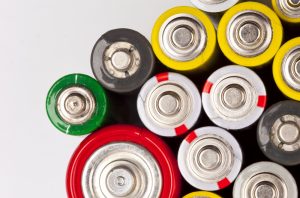
17 Dec How to Dispose of Batteries
 Batteries are an essential, daily household item. They power necessities from watches to our cars and everything in between. But, while these are exceptionally useful items, batteries contain hazardous materials and require proper disposal. So, with every purchase and use of a battery, make sure to consider how you will dispose of it when it’s retired.
Batteries are an essential, daily household item. They power necessities from watches to our cars and everything in between. But, while these are exceptionally useful items, batteries contain hazardous materials and require proper disposal. So, with every purchase and use of a battery, make sure to consider how you will dispose of it when it’s retired.
Different types of batteries require various means of disposal and recycling. However, there are several convenient options for your safe handling. From recycling facilities to designated drop-off facilities, you can always find a way to take care of your old batteries responsibly. And remember to properly store used batteries to minimize the risk of a fire or chemical leak in the meantime.
How to dispose of different kinds of batteries:
- Alkaline batteries: These batteries power your simplest devices. Think flashlights, toys, remote controls, etc. They range in size from AAA to 9 volts. And typically, they can be thrown away or recycled, depending on your local waste regulations.
- Most batteries that were manufactured after 1996 are made of non-hazardous materials and are generally safe to throw in the trash.
- Before you throw them out, check for local requirements. In some places, you’ll need to treat these as hazardous waste and take them to the appropriate facility.
- Check if there is an option to recycle your alkaline batteries. Local electronics retailers, recycling centers, or community centers might offer recycling, which is always your best option! Check Earth911.com for a drop off location near you.
- Do not recycle alkaline batteries from your home with other recyclables. Doing so may pose a threat to the recycling facility workers when they’re compounded.
- Rechargeable batteries: A recycling facility is the best option for your rechargeable batteries. These contain nickel and cadmium, which pose an environmental hazard when they’re thrown in the trash. So be sure that these make their way to a hazardous waste collection site, recycling facility, or an electronic retailer that recycles batteries.
- Retailers such as RadioShack and Staples are great options for easy rechargeable battery recycling. And once again, you can check Earth 911 for participating retailers.
- Button Batteries: These are used in items such as hearing aids and watches and contain mercuric oxide, lithium, silver oxide, and zinc-air. Therefore, be sure to dispose of these at a hazardous waste collection site or recycling facility as they are considered hazardous waste.
- Never put these in the trash. Button batteries contain extremely toxic materials. However, they may be recycled at some electronic retailers.
- Lithium-ion batteries: These batteries are used to portable power electronics like your mobile phone, digital camera, tablet, or laptop and ought to be donated or recycled. You can do so at a recycling center or a hazardous waste collection site, or donate these to refurbishers and recyclers.
- Check the EPA website for businesses that participate in a program called Sustainable Materials Management Electronics Challenge. This will indicate that they recycle and refurbish lithium batteries and other electronic components.
- Ask electronic businesses in your area if they take any lithium-ion battery donations.
- Car batteries: These contain lead-acid, so you’ll need to dispose of these at an auto parts retailer or hazardous waste collection site. You have a few options for disposal. Retailers like AutoZone or Home Depot accept used or dead car batteries, and recycling or waste disposal centers specialize in handling such hazardous materials.
Proper disposal of hazardous materials is necessary not only among large chemical facilities– it is imperative to a safe and environmentally-friendly household as well. So, make sure to responsibly handle all sorts of batteries in compliance with these safety procedures. And if your facility requires professional hazardous waste removal, do not hesitate to call on us at ECTI.

No Comments